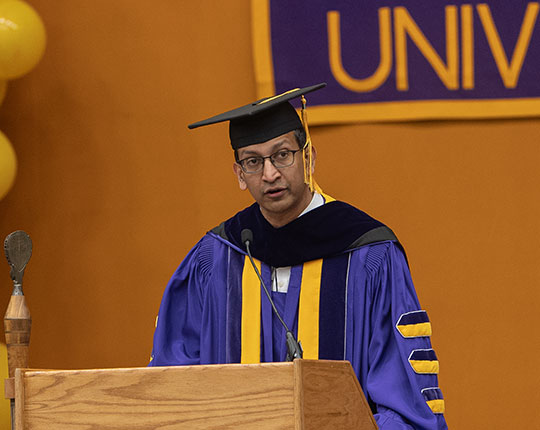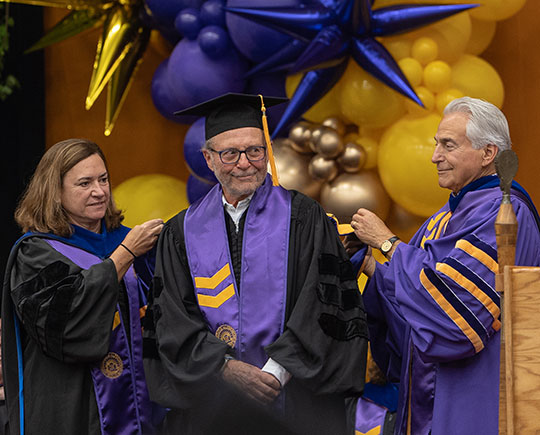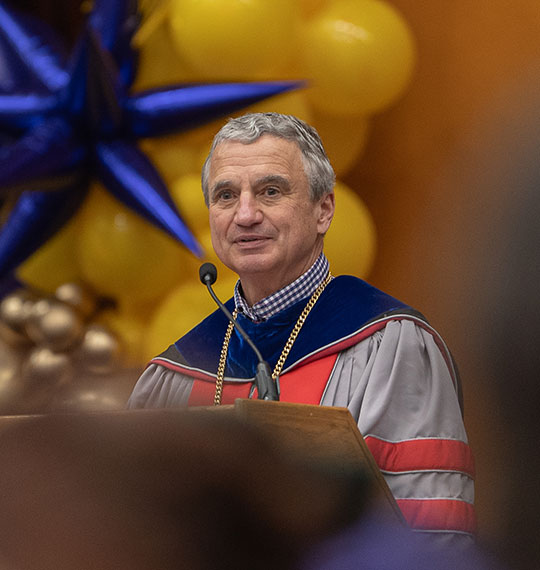Renowned economist tells Alfred University graduates education is key to creating a better world

World-renowned economist Nadarajan “Raj” Chetty spoke to graduating students at Alfred University about the role education plays in creating a pathway to a better life and urged them to make the world a better place by creating opportunities for others.
Chetty, whose research focuses on designing effective government policies which address social and economic disparities, delivered the keynote address for Alfred University’s 188th commencement ceremony on Saturday, May 11, in the Galanis Family Arena.
“This is an important milestone to celebrate not just because it is a testament to all the hard work that got you here but because of the enduring power of education in our society,” said Chetty, the William A. Ackman Professor of Public Economics at Harvard University, and director of Opportunity Insights, a Harvard-based not-for-profit organization which uses “big data” to research ways to give children from disadvantaged backgrounds better chances of rising out of poverty. Opportunity Insights supports policymakers, practitioners, and communities to use its research and data to develop evidence-based solutions for improved economic mobility.
“I’ve devoted my life to studying how we can create better opportunities for everyone in society to thrive, no matter their background. And what I’ve found is that education – and especially the type of education you’ve all received here at Alfred – remains the surest pathway to a better life.”
Chetty received his Ph.D. from Harvard University in 2003 and his bachelor’s degree in economics, also from Harvard, in 2000. He was offered tenure when he was only 28, making him one of the youngest tenured professors in Harvard’s history. Before joining the faculty at Harvard, Chetty was a professor at UC-Berkeley and Stanford University. He is one of the most cited economists in the world. In 2008, The Economist and The New York Times listed him as one of the world’s top eight young economists.
He said he needs to look no further than his family to know the importance of education. His parents, both from small towns in South India, took advantage of educational opportunities, and later passed a passion for learning down to their children.
It was rare in India, Chetty said, for women to attend college, particularly if they had to move to another city to attend classes. The year before his mother graduated high school, a wealthy businessman opened a women’s college in her hometown. She attended that college, went on to medical school, and later completed her residency at the University of Wisconsin Madison. Chetty’s father, who grew up in a low-income family, applied for scholarships to study in the United States and received one to attend Wisconsin Madison.
“The effects of those educational opportunities have cascaded through the generations in our family. Thanks to my parents’ good fortune and hard work, my sisters and I were able to attend the best schools and colleges and are all scientists and doctors ourselves,” Chetty said. “Had the college in my mom’s hometown opened a year later, or had my father not received the scholarship to UW-Madison, I am certain I would not have the opportunities I have had, let alone be giving this talk today.”
Chetty said his organization, Opportunity Insights, has analyzed data relative to more than 100 million Americans to understand how to lift more children out of poverty and help them achieve the American Dream. Education, he says, has shown to be an important tool in affording upward mobility to people from disadvantaged backgrounds.
“What we’ve found is that people’s chances are greatly shaped by the environment in which they grow up. When a child moves to a neighborhood with better schools or gets a chance to attend a high-quality college, we see their lives transformed relative to other comparable kids who didn’t get the same chances. Opportunity matters. And education is one of the keys that opens the doors of opportunity,” he said.
“As a professor, I would like to think that the main reason for student success is what they learn from their teachers. That’s surely part of it, but it turns out to only be a small part. We’ve found that what’s perhaps even more important is the social capital we form in schools and colleges: the connections, and inspiration one gets from friends, mentors, and peers,” Chetty continued. “The milestone you have all achieved today has equipped you with the skills and social capital that will open doors for great success in the years to come. Now the question is what you will do with those opportunities going forward. My challenge to all of you is to take the gift you’ve been given today to carve your own path to success and make the world a better place, inspiring and spreading opportunity to others.”
In closing, Chetty spoke of the importance of pursuing intersections and promoting inclusivity and mentorships—Alfred University’s three core values—to affect positive change in the world.
“I hope you will take what you learned here at this great institution—not just the skills you’ve acquired but the spirit and mission of Alfred— with you throughout your lives,” he said. “Embrace change and adapt as the world around you evolves. Build communities that are inclusive and mentor the next generation. Most importantly, make the world a better, fairer place by bringing opportunity to those around you. Your success will be all our success.”
Chetty has received numerous awards for his research, including a 2012 MacArthur Fellowship—awarded annually by the John D. and Catherina T. MacArthur Foundation, typically to between 20 and 30 individuals, working in any field, who have shown “extraordinary originality and dedication in their creative pursuits and a marked capacity for self-direction”; Harvard’s George Ledlie Prize (2023), awarded for research that made the most valuable contribution to science, or in any way for the benefit of mankind; and the 2013 John Bates Clark medal, given to the economist under 40 whose work is judged to have made the most significant contribution to the field. According to the Chronicle of Higher Education, the John Bates Clark Medal “is widely regarded as one of the field's most prestigious awards... second only to the Nobel Memorial Prize in Economic Sciences.”
Chetty and Jeffrey Maurer ’69, a Life Member of the University’s Board of Trustees, were awarded honorary degrees Saturday.
Chetty received a Doctor of Laws degree, honoris causa, in recognition of his esteemed career in economics and his dedication improving the lives of others. Chetty was elected to the National Academy of Sciences in 2018. In 2020, he received the Infosys Prize for Social Sciences – Economics “for his pioneering research on identifying barriers to economic opportunity and for developing solutions to help people escape from poverty towards better life outcomes.”
Maurer, who served on the Board for nearly four decades, received the Doctor of Commercial Science degree, honoris causa. He was elected to the Board of Trustees in 1984 and served on the Investment and Finance committees as Chair and also on the Nominating, Trusteeship, Executive, Human Resources, Strategic Planning, and Student Affairs committees. Jeff also served on the Campaign Steering and Endowment Campaign Planning committees. He concluded his service on the Board in 2022 and was elected a Life Trustee in 2022.
A 1969 graduate of Alfred University with a Bachelor of Arts degree in biology from, Maurer holds an MBA from New York University and a law degree from St. John’s University School of Law. He is chairman of Evercore Wealth Management—which he and his partners founded in 2008—and Evercore Trust Company, N.A.
Maurer joined Lehman Brothers Trust Company, N.A., in October 2003 and retired as chairman in 2007. He is the retired chairman and chief executive officer of US Trust Corporation. He joined US Trust in 1970 and was named president of that company in early 1990 and chief operating officer in 1994. Upon the merger of US Trust with the Charles Schwab Corporation in 2000, he joined Schwab’s executive committee and board and held those positions until January 2003. Maurer began his career at US Trust in the personal trust area and became an expert in the wealth management business.
In addition to his years of service as a Trustee, Maurer has been a generous supporter of his alma mater. He and his wife, Wendy, are members of the Founders Society at Alfred University. Jeff’s philanthropy helped fund the College of Business Trading Room, the Strategic Investment Fund, the General Purpose Quasi Endowment, the Saxon Inn, Hillel House renovations, the Miller Performing Arts Center, and a maintenance fund for Kanakadea Hall. He is a generous supporter of the Alfred Fund, is a Saxon Circle member, and a supporter of Alfred University’s Common Ground program.

Jeffrey Maurer ’69 (center), Life Trustee at Alfred University, received an honorary degree, Doctor of Commercial Science , honoris causa, during commencement ceremonies Saturday. Placing his honorary degree hood are Carolyn Clark ’90 (left), chair of the Board of Trustees, and Gene Bernstein ’69, a member of the Board of Trustees and Maurer's classmate at Alfred University.
Maurer is Chairman of the Board of RiverSpring Living and the Hebrew Home at Riverdale in New York and is a member of the Board of Overseers and Co-Chair of the Investment Committee for Northwell Health, New York State’s largest health care provider and private employer, with 21 hospitals, approximately 900 outpatient facilities and more than 12,000 affiliated physicians. He is a former Chairman of the American Bankers Association’s Trust and Investment Management Division.
Addressing their classmates were 2024 Marlin Miller Outstanding Senior Award recipients Brian Ngatunga, a business analytics major (marketing minor) from Mwanza, Tanzania, and Emilia Donenberg Smith, an art and physics major from Wilmette, IL.
Winners of the Marlin Miller Outstanding Senior Award are chosen based on scholarship, extracurricular achievement, personal character and conduct, and nominations by faculty, students, staff, or alumni. The award was established to honor Alfred University alumnus Marlin Miller ’54, H ’89, H ’19 one of Alfred University’s most generous supporters. Miller has been a member of Alfred University’s Board of Trustees since 1972.
An Honors Program student, Ngatunga graduated from Alfred University a year early with a 3.95 GPA. He has been inducted into the Delta Mu Delta, Alpha Kappa Phi, Pi Gamma, Mu Kappa Tau, Alpha Iota Delta, Beta Gamma Sigma, and Omicron Delta Kappa honor societies and serves as president of the latter.
Ngatunga spoke about the acts of kindness shown to him during his journey, from his home in Tanzania, to Asheville, NC, where he attended school as an exchange student, to his time spent at Alfred University.
“Whenever I felt the absence of my family, kind-hearted individuals became my family and support system,” he said, noting the generosity and welcoming shown by his host family, the financial assistance provided by a teacher, and the guidance of a school counselor who helped him find Alfred University and secure a scholarship to attend.
“Each act of kindness has left a lasting impact on my life and serves as a testament to the enduring power of kindness,” Ngatunga commented. “Wherever your journey leads, I urge you to become vessels of kindness. In a world often filled with negativity, your acts of kindness can be beacons of light, illuminating the lives of those around you.”
Smith graduated with a cumulative grade-point average of 3.89. The recipient of a Presidential Scholarship, Smith participates in the Honors Program at Alfred University. She is the recipient of the 2023 Natasha Goldowski Renner Prize in Physics and a 2023 American Ceramic Society (ACerS) Scientific Creativity Award.
Smith asked her fellow graduates to close their eyes and imagine the moment they are most proud of during their time at Alfred University.
“Let that moment fill your body, flow through your limbs and into your consciousness. Let it fill you with confidence and purpose and remind you that here is exactly where we’re supposed to be,” she said.
“Even after this ceremony ends, the feeling—this pride and this spark—is yours. We must keep our spark even when times get dark and share it with others. Let us celebrate how we have cultivated it and grown it here at Alfred.”
Alfred University awarded 203 baccalaureate degrees and 63 master’s degrees to graduates who completed their degree requirements in May 2024. The University has already conferred 61 baccalaureate degrees, 23 master’s degrees, and six doctoral degrees to August 2023, December 2023, and 2024 Allen Term (January) graduates.
The University recognized as the following top students (highest GPAs in each school and college) for the Class of 2024:
College of Liberal Arts and Sciences: Makayla Marie Bills, early childhood/childhood education major from Woodhull, NY, and Corrine Nichole Kayes, psychology major from Dewittville, NY, who both earned a 4.00 grade-point average on a 4.0 scale.
School of Art and Design: Benjamin E. Deutsch, art major from Hornell, NY, who earned a 4.00 grade-point average.
Kazuo Inamori School of Engineering: Cameron A. Kenefick, mechanical engineering major from Lindley, NY, with a 4.00 grade-point average.
College of Business: Sienna Patricia Cefalu, marketing major from Amherst, NY, with a GPA of 4.00.

Mark Zupan, Alfred University president, makes closing remarks at Saturday’s Commencement ceremonies.
In closing the ceremony, Alfred University President Mark Zupan referred to the challenges the class of 2024 faced when they first arrived on campus as first-year students, amid the global COVID pandemic.
“Just how different the approach was to where we are today, in terms of arrival times, medical protocols, masks. You had to deal with something that thrived on intersections, one of the hallmarks of our University, and also cut into the mentorship that we do and the inclusivity we promote,” Zupan said. “As attested to by Emilia and Brian, and all of you, the way you’ve displayed resilience, and were able to still lean into those strengths here at Alfred University and make them stronger. That’s something you should be immensely proud of.”
Zupan commended the graduates for their efforts to promote inclusivity on the Alfred University campus. “That important light is needed in today’s world. The more you carry it with you, it will serve you well and will make our world a better place.”
